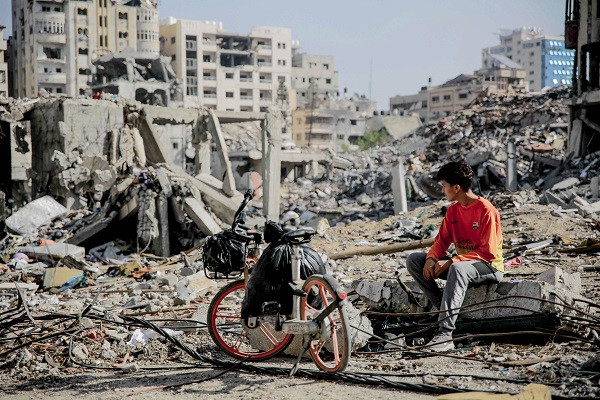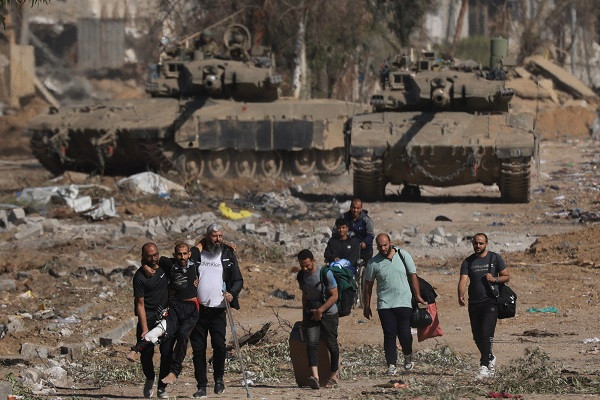— 42 Palestinian inmates to be freed under second phase of agreement
— 14 Israeli captives to be handed over to ICRC by Hamas
GAZA: Israel was set to release a second group of Palestinian prisoners on Saturday in exchange for captives taken by resistance group Hamas, as a truce largely held in the devastated Gaza Strip after seven weeks of brutal Israeli attacks that killed at least 15,000 thousand people.
Israeli prison authorities said 42 Palestinian inmates — both male and female — would be freed under the terms of the agreement, which mandates exchanges at a ratio of three to one. An Israeli official source said 14 captives would be handed over.
The transfers follow an initial exchange Friday, the first day of a four-day truce that largely silenced the guns on both sides.
The second day of the truce appeared to be holding. Only a small plume of grey smoke rose over northern Gaza, the focus of Israel’s air and ground offensive against Hamas, an AFPTV live cam showed.
According to the Israeli defence ministry body that handles Palestinian civil affairs, 200 aid trucks in total entered in the biggest humanitarian convoy since the war began.
Israel has placed Gaza under near-total siege, leaving Gazans struggling to survive with shortages of water and other essentials.
In Rafah on Saturday many waited to fill gas canisters for cooking. “All the people are hoping and ready for it to make their lives easier,” said one resident, Ezzeddine Abu Omeira.
Prior to the war, 500 trucks crossed into Gaza daily, according to OCHA, the United Nations humanitarian agency.
The UN estimates that 1.7 million of Gaza’s 2.4 million people have been displaced by the fighting. Thousands have now been returning to what is left of their homes.
“We are civilians,” Mahmud Masood, standing in front of flattened buildings in Jabalia, northern Gaza. “Why have they destroyed our houses?”
Israel’s army claimed early Saturday that it downed a surface-to-air missile launched from Lebanon towards an Israeli drone. In response, the army claimed Israeli warplanes also struck the infrastructure of Hezbollah.
An Israeli-owned ship suffered minor damage in a suspected attack by a drone in the Indian Ocean on Friday, a US defence official confirmed on Saturday.
Hamas, earlier on Saturday, shared a list of captives to be released today with Israel, following the release of 24 captives the previous day, the first of a planned four-day truce.
Israeli security officials were reviewing the list, the office of Prime Minister Benjamin Netanyahu said in a statement.
US President Joe Biden expressed hope the pause could be extended, however.
The released captives, including Thai farm workers, were transferred from Gaza and handed to Egyptian authorities at the Rafah border crossing, along with eight staff of the International Committee of the Red Cross in a four-car convoy, the organisation said.
They were then taken to Israel for medical checks and reunions with relatives.
Qatar, which acted as a mediator for the truce deal, said 13 Israelis had been released, some with dual nationality, as well as 10 Thais and a Philippine national – farm workers employed in southern Israel when they were captured.
Thirty-nine Palestinian women and children detainees were released from Israeli jails, some after years of imprisonment.
Biden said there was a real chance of extending the truce, adding that the pause was a critical opportunity to get humanitarian aid into Gaza.
He declined to speculate how long the Israel-Hamas conflict would last. Asked at a press conference what his expectations were, he said Israel’s goal of eliminating Hamas was legitimate but difficult.

A Palestinian youth sits next to his bicycle amid the rubble of destroyed buildings in Gaza City on the northern Gaza strip following weeks of Israeli bombardment. PHOTO: AFP
The Palestine Red Crescent Society said 196 trucks of humanitarian aid carried food, water and medical supplies through the Rafah crossing on Friday, the biggest such convoy into Gaza since the territory was blockaded by Israel.
About 1,759 trucks have entered the narrow besieged enclave since Oct 21, it added.
Palestinians cheer release of prisoners
On the other side, Palestinians cheered the return of prisoners from Israeli jails.
Of the 39 prisoners freed by Israel on Friday, 28 were released in the occupied West Bank, an AFP correspondent reported, while the other 11 were brought to annexed east Jerusalem, according to the Palestinian Prisoners’ Club.
Crowds of Palestinians in the West Bank set off firecrackers, waved flags and whistled as two white coaches ferried prisoners out of the Ofer military camp, according to AFP journalists at the scene.
“I spent the end of my childhood and my adolescence in prison, far from my parents and their hugs,” freed prisoner Marah Bakir, 24, told AFP after returning to her home in annexed east Jerusalem.
“That’s how it is with a state that oppresses us.”

Palestinians fleeing the north along Salaheddine road help a man with a bandaged leg as they walk in front of Israeli army tanks in the Zeitoun district on the southern outskirts of Gaza City. PHOTO: AFP
Earlier in the evening, Israeli authorities fired tear gas to disperse the crowds. The Palestinian Red Crescent said three people were shot and wounded by Israeli security forces.
“The police are in our house and are stopping people from coming to see us,” said Fatina Salman, whose daughter Malak, now 23, was among those released.
Israeli Prime Minister Benjamin Netanyahu, meanwhile, vowed to bring all the Hamas captives home.
“This is one of the goals of the war, and we are committed to achieving all the goals of the war,” he said.
Jens Laerke, spokesman for UN humanitarian agency OCHA, expressed hope that the pause would lead “to a longer-term humanitarian ceasefire”.
Gazans have struggled to survive with shortages of water and other essentials.
The ceasefire also sparked a mass movement of thousands of people who had sought refuge in schools and hospitals from relentless Israeli bombardment.























